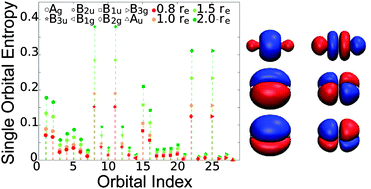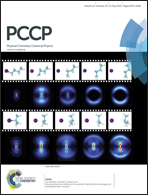Quantum entanglement in carbon–carbon, carbon–phosphorus and silicon–silicon bonds†
Abstract
The chemical bond is an important local concept to understand chemical compounds and processes. Unfortunately, like most local concepts, the chemical bond and the bond order do not correspond to any physical observable and thus cannot be determined as an expectation value of a quantum chemical operator. We recently demonstrated [Boguslawski et al., J. Chem. Theory Comput., 2013, 9, 2959–2973] that one- and two-orbital-based entanglement measures can be applied to interpret electronic wave functions in terms of orbital correlation. Orbital entanglement emerged as a powerful tool to provide a qualitative understanding of bond-forming and bond-breaking processes, and allowed for an estimation of bond orders of simple diatomic molecules beyond the classical bonding models. In this article we demonstrate that the orbital entanglement analysis can be extended to polyatomic molecules to understand chemical bonding.


 Please wait while we load your content...
Please wait while we load your content...